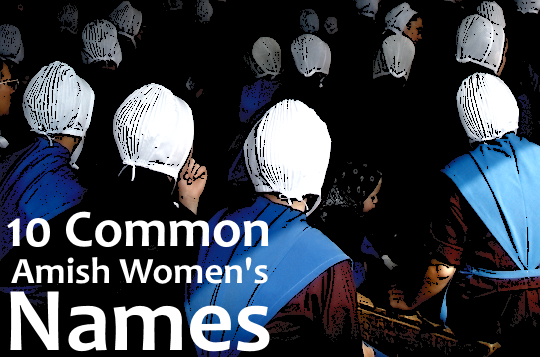Mystery Of Sudden Cardiac Death In Amish Children Solved
In tragic instances dating back to at least 2004, otherwise healthy Amish boys and girls have died suddenly while playing, with no clear explanation as to why.
These cases occurred not in one community, but in multiple states including Pennsylvania, Delaware, Kentucky, and Iowa.
Now, this mystery spanning 15+ years has been solved. Research looking at two extended families has unlocked the genetic cause of these deaths.
From the Syracuse Star Tribune:
Research led by Mayo Clinic has solved a 2-decade-old mystery about why so many otherwise healthy children and young people in Amish communities have been dying from sudden unexplained cardiac deaths.
Examining the DNA of four Amish siblings who suffered cardiac deaths while playing or exercising, researchers found they all had a duplication of specific genetic material that put them at risk.
Further research found the same genetic defect in children from other Amish families who suffered unexplained cardiac deaths — and that the defect could be passed down only if both birth parents carried the defect.
Fifteen years ago these deaths were shrouded in mystery. The development of genetic technology has brought us to a point of clarity:
Genetic testing wasn’t sophisticated enough to find the defect after the deaths of the first two adolescents in 2004, and before the more recent deaths of two of their siblings. But the discovery now provides a way to find out if future generations of children are at risk, said Dr. Michael Ackerman of Mayo’s Windland Smith Rice Sudden Death Genomics Laboratory.
Now that this research work has revealed the cause, what can be done? And also importantly, will something be done? (link to the study in the JAMA Cardiology Journal)
How will this knowledge be used?
The research is important because it has revealed a clear “gold standard biomarker” in the words of Ackerman.
In theory, the information that you are a carrier – and your potential partner is as well – could influence your marital decisions.
Amish people could have themselves tested, determine if they are carriers, and avoid pairing off with other carriers.

Image: Cindy Seigle
Could that happen in practice? I don’t know if that approach would be welcomed in many Amish communities. The spirit of “accepting God’s will” remains strong in many places, one reason some Amish avoid SMV triangles and even smoke detectors.
However, that’s not to say no Amish would be open to this. Amish in many places have been willing to participate in genetic research, often motivated by the idea of finding out the causes of unexplained deaths and illnesses experienced in their families.
Yet it’s easy to see how this could generate a stigma in these tight-knit communities. Knowledge of which people and families are carriers could become public and easily spread in these closely-connected settlements.
The idea of what I describe above would be understandably difficult to absorb, even “disruptive” to use a word from the article.
Alternatively, you could wait to be tested until you have formed a bond with a special someone. However, by that point you might already be far down the road emotionally.
A double-positive result would complicate matters, to say the least. Some Amish would no doubt still choose to marry and have children, and leave it in God’s hands.
That said, it should be re-noted that the research covered deaths in just two extended families.

Image: Ed C
It’s possible that these sudden cardiac deaths are limited to members of just these two families, or relatively few beyond them.
In that case, the above question would appear to be simpler, as regards this condition, since it’s already well-known which families have a history of this problem.
But the same idea, and the difficult questions which follow, could still apply for other ailments affecting Amish people which manifest in individuals carrying two copies of an abnormal gene.
Other solutions
Beyond personal genetic knowledge influencing relationship decisions, other possibilities for those facing the cardiac death syndrome include potential medications and treatments. Children who have both copies of the defective gene could have defibrillators implanted.
These are uncomfortable things to think about. But it can be a life-and-death matter in Amish society, where the “founder effect” and marriage customs have led to rare genetic ailments being found in Amish bloodlines – and few other places besides.
Regardless of how this research is applied Ackerman says that the knowledge has at the least brought solace to some families. “We can tell them the root cause … why their children died tragically and suddenly while playing. That is powerful medicine itself.”










Cardiac deaths
I’m glad a reason was found. Wasn’t it also God’s will that a solution was found to help avoid these deaths? wasn’t it also God’s will that those triangle signs were thought of and produced in order to avoid accidents for everyone concerned? Wasn’t it also God’s will that electricity and indoor plumbing be discovered/invented? If yes, wouldn’t it also be God’s will that everyone be able to avail themselves of all these safety measures? Wouldn’t the refusal of these gifts be an insult to God? I get that there’s free will, etc. but, the Amish live in cult-like fashion, everyone looks and behaves, and “believes” in a certain way, which is dictated by a few older men, which means the only free will for the Amish is to choose whether or not to live in a cult-like manner? Just asking. To me, this smacks of control by a few over the many.
To me it seems you are not “just asking” but your questions are meant simply to make your point. It’s pretty clear you carry a strong bias against “the Amish”. However I’d point out that you’re making a mistake by grouping all Amish into one group. While there are many religious elements that unite them, they can differ quite a bit as to what technology and material things they permit. Most Amish do use the triangle, most Amish do have indoor plumbing. Amish in general restrict electricity (99% do not permit a public electric line connection to their homes) not because they think it is inherently “evil” or against God’s will, but for a few reasons including that they don’t wish to welcome the ease of access to electrically-powered technology and the potential bad influences (television, internet) that public electricity enables into their homes.
https://amishamerica.com/do-amish-use-electricity/
Just because a technology was created does not mean God “wills” all of us to use it in an unfettered way. See smartphones.
Also, how exactly do you define a “cult”?
I would add...
“Control by a few of many” reflects a lack of understanding of the Amish decision making process. We are developing a society whereby technology and science is controlling the many. The day may come when we wish we’d paid more attention to the Amish.
Religious freedom
Indeed? It might sound as though I am lumping all the Amish together; I am not. I am basing my comments and opinions on my personal encounters with several Amish families in my state. I have come to know these families over the years and have had many interesting and insightful conversations with them. What I know, I learned from them.
I define a cult as a group of people, usually led by the males of the group, who dress alike, look alike, and speak a language that is theirs only. They have limited education and limited skills and opportunities, thereby ensuring their remaining within the fold. They stay away from those who are different for fear of being “contaminated”. The girls marry young, have child after child, to the point of exhaustion and early old age symptoms, in many cases, if not most. The older children raise the younger children. Amish can’t leave and still maintain a relationship with their families. They are shunned if they do. I have trouble with people romanticizing the Amish lifestyle because they find their own lifestyle too hectic, stressful and fast. The Amish are good people, trying to live a simple lifestyle that keeps them safe from the outside world and closer to God. I get that. I also get the realities of that lifestyle. If I sound biased against the Amish, I am not, I am biased against any entity, usually male, rarely female, that imposes strict rules upon others, using God, heaven and hell, to justify them. It is a form of control by the few over the many. Does this exist outside the Amish world? Absolutely! By the way, I consider all religions to be cults! Some are more cult-like than others. But, that’s another issue!
It's a matter of perspective...
As I’ve already mentioned, the Amish decision-making process does not reflect “control by a few of many.” And the Amish way is not “imposing strict rules upon others.” Each community or district actually makes it’s own “rules” based on member input.
The Amish “reject” less than most people think. It’s more accurately a case of refusing to adopt, at least not without critical thinking and prayer. (I’m chuckling as I think about non-Amish parents rejecting a child’s idea with “So if everybody jumped off the bridge, you would too?”) Not all Amish agree on everything… nearly every generality made about the Amish is simply false.
From a medical perspective (and not just), there are cases where the community (district) has agreed to exceptions of “rules” in specific situations to accommodate individual need.
I would add that I do not agree with the definition of “cult” posted here… nor would most dictionaries. But even if that definition were accurate, I would still not consider the Amish a cult–it’s an unfair label. I prefer to call them “Amish.”
God's will
Continuing that line of reasoning, isn’t it God’s will that man keeps developing scientific knowledge? Isn’t the alternative that science is un-Godly, or even evil? In any case, this discovery brings into sharp contrast the fact that science is developing the ability to relieve human suffering with increasingly sophisticated strategies. Granted that Amish don’t favor advanced schooling, do they also reject the benefits to mankind of advanced scientific learning by non-Amish? Is this an insoluble conflict between Amish belief and modern realities? I guess I’m asking if the Amish are anti-science and if so how do they rationalize being so?
Good questions, the Amish definitely benefit from science and technology and the advances that have come from higher learning. Medicine and health care are among the most obvious examples. I think some Amish people, even many are aware of this. Though they don’t produce scientists and higher learning and its fruits from amongst themselves, they certainly derive benefit from those things. They’re not generating it but they’re benefiting from it. Is this a bad thing?
I wouldn’t say they are anti-science or see science or technology as inherently evil (though you can certainly “do evil” in the way you choose to use some technologies). They just don’t promote much formal scientific learning among their own as it can be incompatible with Amish Christian beliefs (eg, a literal reading of the Bible). People critique them for this, but to me it seems like they are just another group in a huge and diverse North American society.
I think generally they appreciate those fruits of higher learning that enable them to live better lives, even though they don’t directly contribute to advances in science and technology (at least not in the conventional way).
I do believe as a whole they offer other things of value to society however, and not everything is measured by a group’s contribution to scientific advancement.
It’s not that they are anti science or education, but wary of intellectualism, or the worship of the human intellect. They know science, like information and power, can be wrong, fake, or bought.
Very interesting article — with a lot of domino-effect ramifications that didn’t immediately come to my mind. Thanks for sharing it.
It will be interesting to see how the knowledge is used. It seems like it is a pretty limited disease but hopefully the clear genetic basis will help those that are already known to be carriers in those specific families to maybe steer in a different direction than they might otherwise have gone when searching for a life partner. I realize that idea does conflict with the notion of God’s will acting in everything. At the least hopefully those at risk children are going to get some form of treatment or preventative device to give those families more peace of mind.
I often think of the comparative case of Iceland when these stories on genetic ailments in Amish communities appear. Iceland is nearly identical in population size to the Amish (about 360,000, roughly 90% of which are native Icelandic) and face similar issues as far as their genetic pool and finding marriage partners is concerned. They have leveraged technology to help prevent close-relative marriage (for example, a smartphone app which can tell users if they are closely related with a simple tap: https://www.cbc.ca/news/business/kissing-cousins-icelandic-app-warns-if-your-date-is-a-relative-1.1390256). At the same time and unlike the Amish, they are not a particularly religious population, in line with the general trend in Europe (though whether Iceland is European or North American is another question entirely:)).
Yes, it will be interesting. My guess is that the various communities would act upon this as they would most any technology-type advancement. I don’t remember the post saying the specific communities these live in, so I don’t know where on the progressive spectrum these families may fall (and thus can’t venture a specific level of acceptance).
Interesting comparison with the Icelanders — a situation I have not heard of before. And what you bet that their solution (the kin-app) will soon be expanded to be a part of at-large online dating apps. “The person you are considering here is your 18th cousin, twice removed.” lol
Technology
The Amish are generally far advanced of the rest of us today. Typically solar powered homes,immune to the grid failures predicted in the future by the get ready people at DHS. Cult-like? Amish have zero divorce and happy families. The shunning of those who leave usually involves eating at separate tables in the same house, no big deal. You will rarely find an Amish home without hot water and flush toilets (Schwartzentruber Amish). The state of Michigan uses outhouses at their state parks, so I maintain the right of the Lenawee County Schwartzentruber’s to do the same. But generally Amish are light years ahead. They are also the finest craftsmen, in demand for their skills. I think some people are jealous!
Some fifty years ago, touring Pennsylvania-Dutch country with my wife and three-year-old daughter, we spent a night at what we’d today call a bed-and-breakfast on an Amish farm. Next morning, after breakfast, we visited the barn, fresh-smelling from newly strewn hay, so different from the manure-redolent barns of my dairy-farmer friends. That afternoon, we chanced to see a school bus discharge a dozen or so children, several of whom appeared to have Down’s Syndrome, the plague from inbreeding in these small communities.
Early Sudden Heart Attack Gene in Non Amish
This episode of Unsolved Mysteries covered early heart attack taking the lives of multiple family members in a family that does not happen to be Amish. https://unsolvedmysteries.fandom.com/wiki/Santos_Family
Some Orthodox Jews came up with an interesting solution to the community stigma problem...
I believe a Rabbi from a group of Orthodox Jews tried to find a solution to this problem in their community, where marriage is semi-arranged and the stigma of being known to have a genetic condition was immense. It isn’t a non-contraversial solution, but it is interesting to speculate as to whether something similar would be acceptable to or useful for some of the Amish groups – if there were any where the community stigma (rather than their interpretation of what it means to accept God’s will, or their not being happy with using a database even at one remove) would be the problem with Western style individual testing schemes.
Basically, in that Jewish community, prior to starting dating, young people could be tested to see if they were carriers of recessive genetic diseases without having to know the result: instead, they got a personal identification number (pin). At a very early stage of dating, both parties send in their pin, and if they are both carriers of the same thing, an alert will spring up, and their Rabbi will quietly advise them not to continue. (I assume if someone wanted to know they could be tested in the usual way or request the information; the point was, they didn’t have to know, and it didn’t have to become public).
I suppose it is basically a version of the “kissing cousins” app, with the extra dimension that it’s being operated by a community body, rather than by an individual.
R.e. the cult problem: I think Western secular society could do with looking a bit harder at itself, regarding manipulative control of the many by the few and brainwashing. I mean, I sometimes get the impression that “brainwashing” usually merely means teaching something that the person speaking happens to disagree with, rather than being any “teaching” which intends to prevent the child/person taught being capable of thinking! That is, after a while, it comes to sound as if some secular people label a Christian parent as “brainwashing” their child when they explain that God exists and their view on something contraversial (same-sex marriage, abortion, etc.), while a secular parent or teacher, explaining the opposite-value-set with much more force and much more contempt for those who disagree, is merely regarded as “engaging in appropriate education.” In fact, a lot of the things that are said by people who advocate the practices the Christian tradition tends to object to, would meet the real criteria for brainwashing very much more than most of our religious education (lacking though it often is in many ways). I’m not saying things are always that way round – far from it, we (Christians) have plenty to repent of on this sort of front, and we should know better – but intolerance and control of thought are attitudes to beliefs rather than particular beliefs, and no thought system is immune to them.